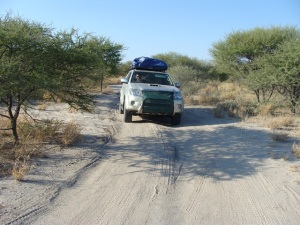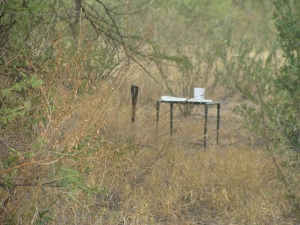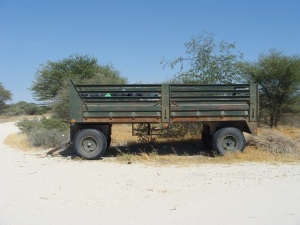When you have experienced your first overlanding trip into one of South Africa’s neighboring countries, you get a new sense of protectiveness towards nature and the people of these countries. It’s a privilege to be able to visit their national parks as these areas are some of the only places in Southern Africa where you can still camp in unfenced camp sites.
The remoteness of these camp sites is something that cannot be explained to fellow campers; I’ve seen people raising their eye brows in disbelief when I tell them that during our 2013 trip to Botswana, three days went by in the Central Kalahari Game Reserve before we saw other people for the first time. The quietness and pitch black nights is truly a luxury that you don’t get back home in the hustle and bustle of city life. It’s an experience that you have to have for yourself before you can understand what’s going on in an overlander’s head.
With the increase in popularity of over land trips, came the need for an overlander’s code and I’ve been seeing quite a few publications with articles on how you should conduct yourself whilst in the bush. I thought I would share some of the things we’ve experienced ourselves personally, and how this tie in with what’s accepted behavior whilst overlanding.

FIRES & FIREWOOD
Southern Africa has been experiencing the worst drought we’ve seen in many years, and our northern neighbors have also been suffering the effects. The veld is very dry with loads of dead trees and grass which we know is conditions that’s very conducive to veld fires. Hence why it goes without saying that you cannot leave any camp fires unattended as it takes only the smallest of sparks to ignite a dry veld. Nature also has way of correcting itself so the dead trees and branches will find its way back into the circle of life, and should therefore not be used for fire wood. Always take your own wood with you into the national parks; not only is against the law to pick up branches for fire wood, it’s also against the law of nature. Most of the camp sites have deep holes where you can dump your ash from your camp fire, so make sure there’s no trace of your camp fire by the time you leave for your next destination.
DRIVING IN THE BUSH
Cowboys don’t do overlanding, so don’t attempt obstacles and sand driving in 2WD. You might end up damaging your vehicle as well as causing serious eco-damage to the terrain. Rather engage 4H on gravel roads (to reduce corrugations) and stay on the established tracks. Deflate your tyres when the road becomes sandy. It takes many years for the terrain to recover from off road driving and the idea is not to add to pre-existing eco-damages.
BUSH CAMP SITE MANNERS
The reason why we are in the bush in the first place, is to experience nature at its rawest and to reconnect with your family and yourself. This is not the place for music or screaming matches. Children needs to be taught from a very young age that you need to be respectful of the bush and its inhabitants, and one of the ways we show respect is to keep noise levels at the minimum. Another practical reason for this is so that you’re aware of what’s happening around you. Animals often wander into the camp sites and the noises of children shouting and running around camp, might just attract unnecessary attention.
And when nature calls, there’s two rules – POO must be buried and TOILET PAPER must be burnt. There’s nothing more unsightly and unhygienic than a bush camp site littered with toilet paper and “land mines” behind every bush. Always take your litter with you, the national parks have dumping bins where you can discard of your rubbish at the end of the trip. Burn what you can, and the rest goes in a strong black bag to get rid of when you exit the park.
Leave your generator at home. There is nothing worse than listening to the humming sound of a generator trying to compete with sounds of nocturnal animals in the wild. Rather go for solar power options. Not only are they quiet and they don’t cause noise disturbances but it’s the eco-friendly way of powering your camp site. Besides, you’ll find that you should rather be carrying fuel for your vehicle with you, than storing it for use with a noisy generator.

BEHAVIOR AROUND ANIMALS
Most of what I’m about to say, is common sense but yet you still see pictures of people acting ignorantly towards animals. Those predators are quicker than you think, they can cross the metres between their hiding spot and your open car window within seconds, and most of the time quicker than you can react, so it goes without saying that you should keep all limbs inside your vehicle as soon as you spot a predator animal. Small children also need to be kept fully inside your vehicle as they look like an easy prey to the predators. Don’t hog a sighting, especially if there are quite a few people that are trying to see the animals. More often than not you’ll be the only vehicle at a sighting, especially if you’re travelling in the remote CKGR regions but if you’re parked in such a way that other people see, make way and be courteous towards your fellow travelers.
Another big no-no is DO NOT FEED THE ANIMALS. Almost all of the aggressive behavior by animals towards humans, stem from the fact that people feed them, or in the case of larger predators, bait them for those awesome pictures they like to share on social media. It’s never ok to feed wild animals as this teaches them not to be afraid of humans anymore. We almost had a serious incident with a baboon at Third Bridge camp site in the Moremi Game Reserve, where the alpha male tried to attack my eleven year old son. We were very fortunate that he didn’t end up hurting my boy but it could have been a serious injury, or even worse, had he been able to carry out his attack. They were “taught” by campers who fed them in the past, that tents house food and other things for them to steal, hence why they keep on coming back for more. In the end, the animals will most probably be killed for behavior that they were taught by humans. An increase in the number of animal attacks will also lead to the camps being fenced in, and with it, take away the privilege of camping in the African bush. Just don’t feed them, ever.

RESPECT THE LOCALS – THEIR LAWS AND THEIR PEOPLE
The saying “When in Rome…” comes to mind. Make sure that you are aware of the rule of law in the country that you are planning on visiting. In Botswana we’ve found that they are very strict as far as speeding is concerned, with speed traps everywhere on the main roads. The fines are also quite stiff so always make sure that you stick to the speed limit in that country. They also have strict rules about the transport of raw meat as well as fruit and vegetables and they have several vet-gates where they search vehicles and confiscate food that are not allowed to be transported. This is to prevent the spreading of diseases. I’ve also heard of several cases of fines for LED lights on vehicles in Namibia. The best way to prevent problems with the law is to avail yourself of their rules and laws and to stick to it. You’ll often see kids in the street when you pass through smaller towns, don’t give them sweets or money, this only encourages a beggar mentality and the sweets are bad for their teeth, as they don’t also have proper hygiene regimens in place.
Do support local trade! In most of the larger towns you’ll find almost all of the well-known stores that we know in South Africa such as Woolies, Spar, and Wimpy etc. so try and buy most of your groceries when you get there. Also feel free to support the local entrepreneurs in the towns such as sightseeing operators and so on, their knowledge about the areas are vast and rich and it’s great to experience another country through the eyes of the locals.
The biggest thing to remember when travelling in Southern Africa is to enjoy yourself and revel in the beauty of its nature. We are truly blessed to be in a position where you can be inside the African wilderness within a couple of hours drive, and it’s our responsibility to treat these privileges with respect and care, so that it can be cherished and nurtured for many generations to come…..






This is great. I’ve bookmarked this and I think I may adapt it for an American audience. Maybe you could help with this. Of course, if and when I do I’ll give you credit and link back to the original post. I’ve long enjoyed your blog. I think that many people would benefit from reading the blogs of regular overlanders and not those who have hundreds of thousands to spend on a rig.
Thanks – Tobias
LikeLiked by 1 person
Sure any time Tobias, let me know if you need any input from my side. Very few people can afford those big overlanding rigs so I also like reading about how the “normal” people do their thing 🙂
LikeLiked by 1 person
Thanks Linda. We leave on a short weekend exploring the Trans-Wisconsin Adventure Trail Overland Route this weekend, but Niecie and I will be in touch soon to get your feedback on a few ideas. Maybe connections permitting we could Skype with you guys. We’re really new to overlanding and have found the community to be filled with really great information as well as a lot of questionable stuff.
LikeLike
Sounds great! Enjoy your trip!
LikeLike